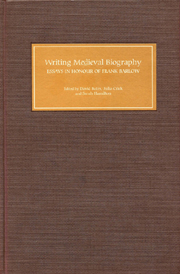Book contents
- Frontmatter
- Contents
- Preface
- List of Abbreviations
- Introduction
- 1 Did Charlemagne have a Private Life?
- 2 Bones for Historians: Putting the Body back into Biography
- 3 ‘Carriers of the Truth’: Writing the Biographies of Anglo-Saxon Female Saints
- 4 Alfred and his Biographers: Images and Imagination
- 5 Re-Reading King Æthelred the Unready
- 6 Writing the Biography of Eleventh-Century Queens
- 7 The Flemish Contribution to Biographical Writing in England in the Eleventh Century
- 8 The Conqueror's Earliest Historians and the Writing of his Biography
- 9 Secular Propaganda and Aristocratic Values: The Autobiographies of Count Fulk le Réchin of Anjou and Count William of Poitou, Duke of Aquitaine
- 10 Reading the Signs: Bernard of Clairvaux and his Miracles
- 11 Arnulf's Mentor: Geoffrey of Léves, Bishop of Chartres
- 12 The Empress Matilda as a Subject for Biography
- 13 The Gesta Stephani
- 14 Writing the Biography of Roger of Howden, King's Clerk and Chronicler
- 15 Writing a Biography in the Thirteenth Century: The Construction and Composition of the ‘History of William Marshal’
- 16 The Strange Case of the Missing Biographies: The Lives of the Plantagenet Kings of England 1154–1272
- Index
7 - The Flemish Contribution to Biographical Writing in England in the Eleventh Century
Published online by Cambridge University Press: 12 September 2012
- Frontmatter
- Contents
- Preface
- List of Abbreviations
- Introduction
- 1 Did Charlemagne have a Private Life?
- 2 Bones for Historians: Putting the Body back into Biography
- 3 ‘Carriers of the Truth’: Writing the Biographies of Anglo-Saxon Female Saints
- 4 Alfred and his Biographers: Images and Imagination
- 5 Re-Reading King Æthelred the Unready
- 6 Writing the Biography of Eleventh-Century Queens
- 7 The Flemish Contribution to Biographical Writing in England in the Eleventh Century
- 8 The Conqueror's Earliest Historians and the Writing of his Biography
- 9 Secular Propaganda and Aristocratic Values: The Autobiographies of Count Fulk le Réchin of Anjou and Count William of Poitou, Duke of Aquitaine
- 10 Reading the Signs: Bernard of Clairvaux and his Miracles
- 11 Arnulf's Mentor: Geoffrey of Léves, Bishop of Chartres
- 12 The Empress Matilda as a Subject for Biography
- 13 The Gesta Stephani
- 14 Writing the Biography of Roger of Howden, King's Clerk and Chronicler
- 15 Writing a Biography in the Thirteenth Century: The Construction and Composition of the ‘History of William Marshal’
- 16 The Strange Case of the Missing Biographies: The Lives of the Plantagenet Kings of England 1154–1272
- Index
Summary
AS IS WELL KNOWN, there was an apparent dearth of indigenous literary talent in England in the first half of the eleventh century, when relatively little by way of historical or hagiographical work was produced in Latin. The gap is particularly striking when compared with the flourishing centres of Canterbury, Winchester, Ramsey and around Wulfstan of York and Ælfric at the turn of the millennium, and the growing interest in the past witnessed in the early twelfth century. The political upheavals of the eleventh century, in the form of foreign occupation by the Danes and Normans, could easily be blamed for the lack of written records. Interestingly, it was another group of foreigners, the Flemish, who filled the vacuum left by the unproductive English. The Flemish biographers had relatively little impact on what we now might call the formal art of the written portrait, which after all had been well practised all over western Europe. Yet what made the Flemish immigrants in England stand out in the Latin tradition was their remarkable degree of sympathy for women (and in particular queens), lay and ecclesiastical, alive and dead. Moreover, we can add to this their linguistic expertise, narrative style and eye for detail.
- Type
- Chapter
- Information
- Writing Medieval Biography, 750–1250Essays in Honour of Frank Barlow, pp. 111 - 128Publisher: Boydell & BrewerPrint publication year: 2006



